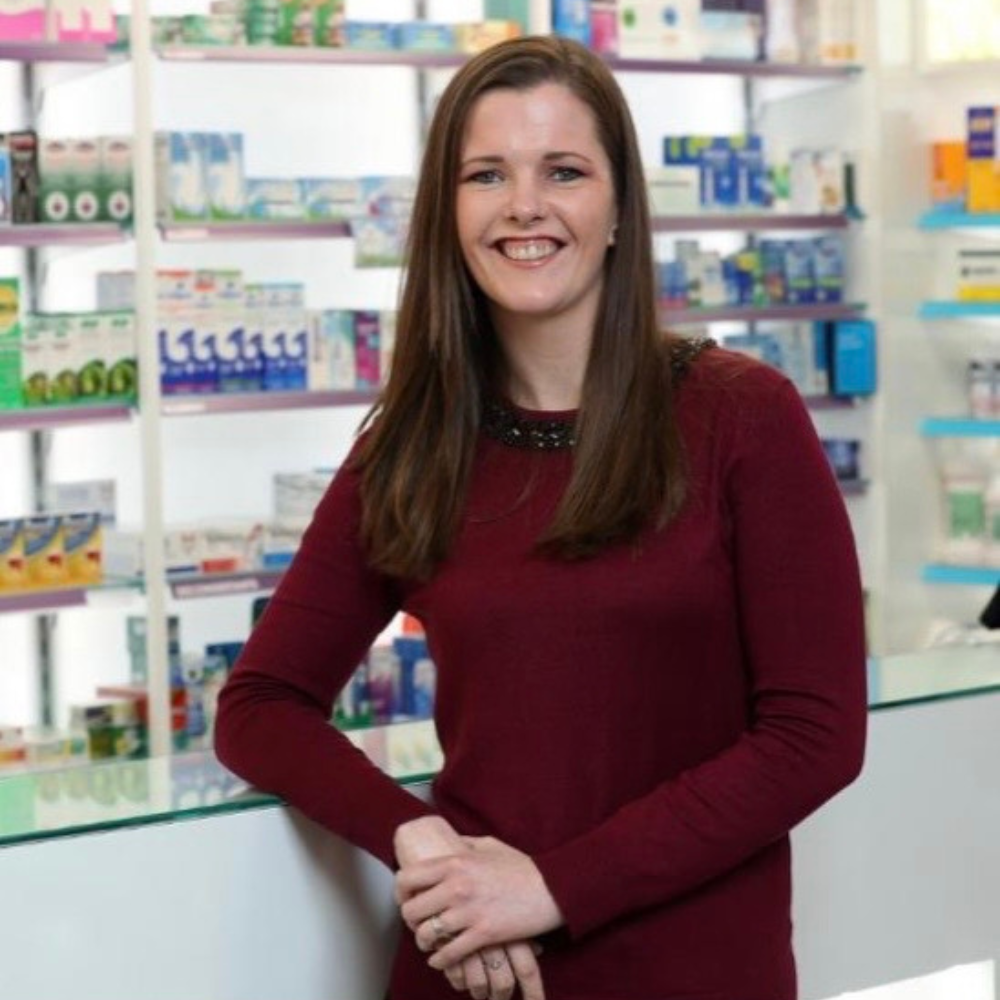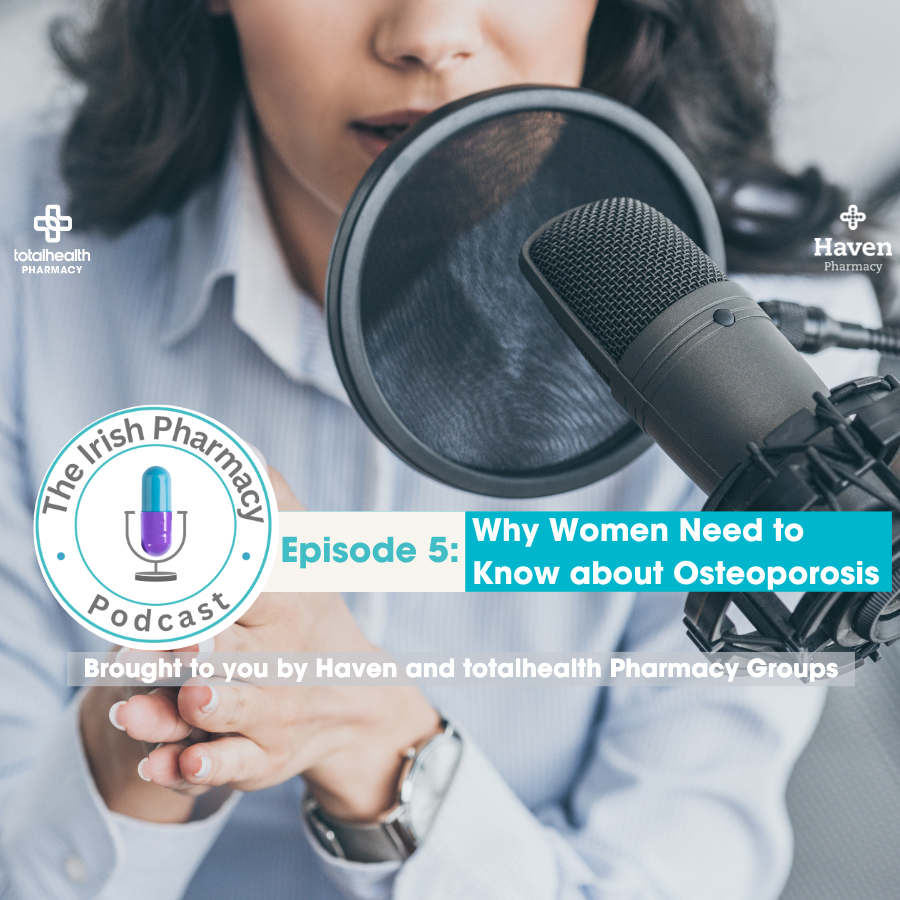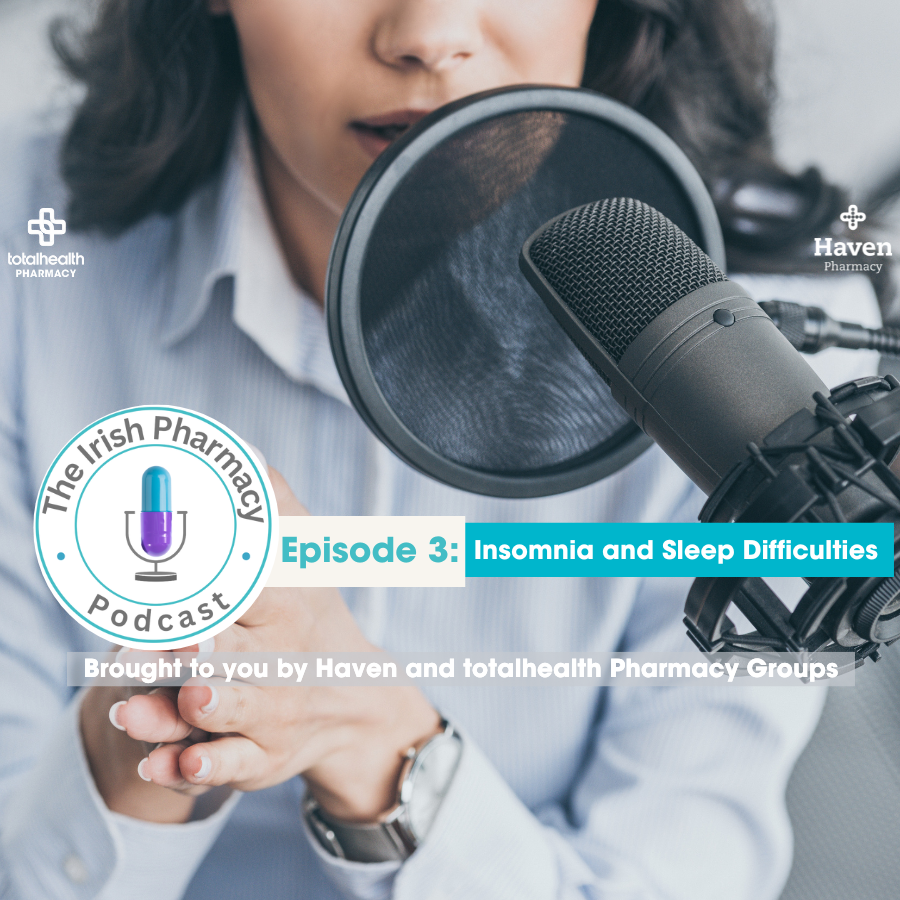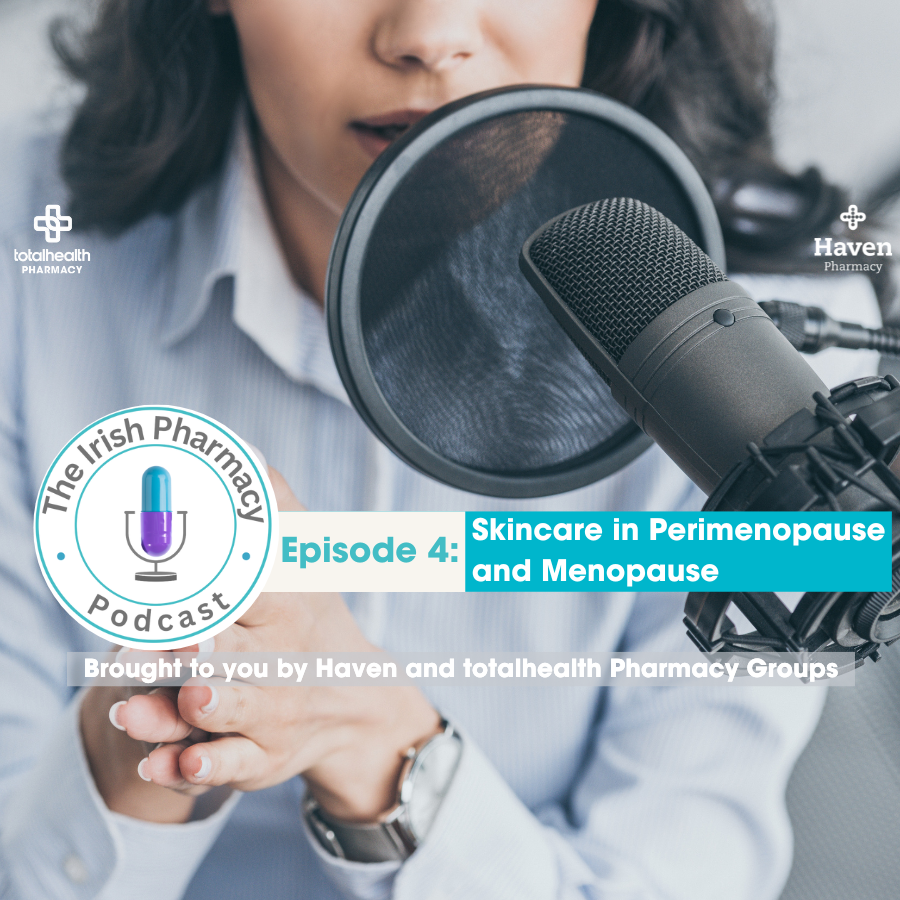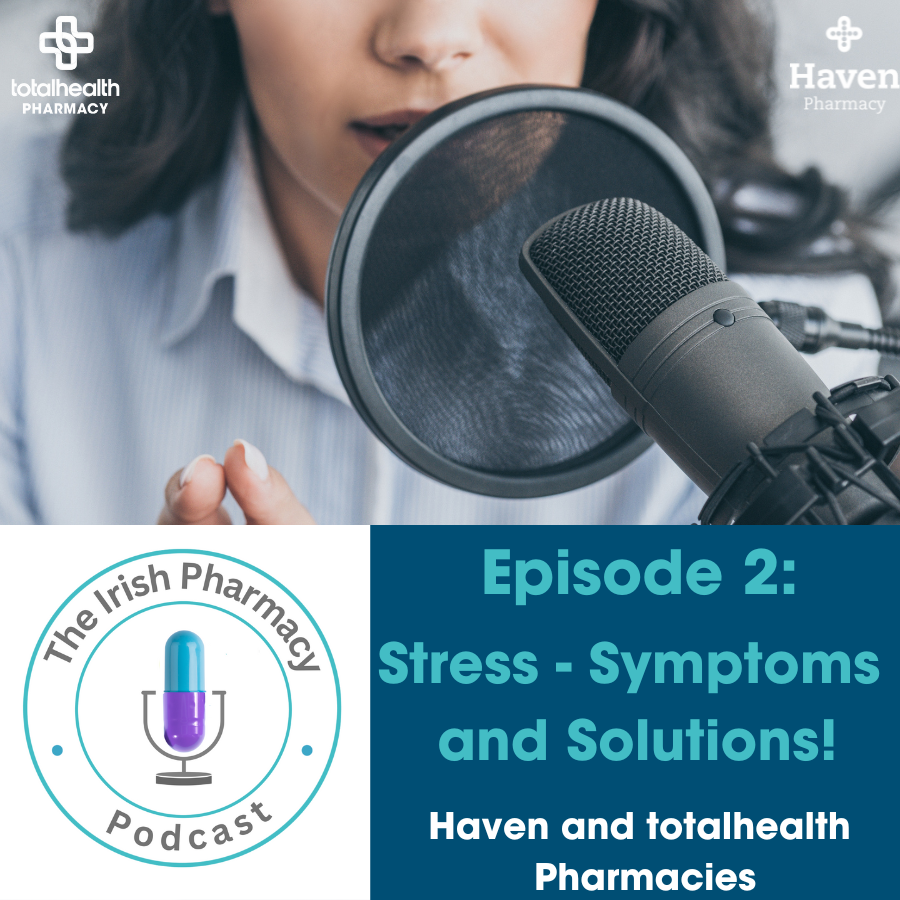Episode Transcript
Speaker 0 00:00:00 <silence>
Speaker 1 00:00:07 Welcome to the Irish Pharmacy podcast. This podcast is brought to you by Total Health and Haven Pharmacies. There are 127 of our independently owned pharmacies located all over Ireland so that we can bring trusted local care to you in your community. And now on the go with this podcast, my name is Sheena Mitchell. I'm a pharmacist from Milltown Total Health Pharmacy. In each episode, I'll be chatting with one of my pharmacist colleagues from the Total Health and Haven Pharmacies where they will blow your mind with all of the amazing information that they have. We aim to bring you reliable and useful health information that you can listen to conveniently at a time that suits you. Today I'm chatting with Nile Tulley from Tully's Total Health Pharmacy in Castle Re County Ross. Common Nile has an interest in all topics relating to health, but recently has taken an extra interest in weight-bearing exercise with his upcoming Berlin Marathon. And later we will discuss why weight-bearing exercise is so important for the prevention of osteoporosis. Thank you so much for joining us today, Nile.
Speaker 2 00:01:07 Oh, I thank you very much.
Speaker 1 00:01:08 So first of all, Nile, before we go into why women in particular need to know a lot about osteoporosis and the earlier you're aware of it, the better. Can you explain what exactly is osteoporosis?
Speaker 2 00:01:21 Osteoporosis is where your bones become weaker. Now everyone, this all happens at different stages and everyone has different risk factors, but generally in your early adulthood, you've nice big, thick, strong fat bones, lots of calcium when you were, when you were younger and that kind of thing. So in your general ad, adult early life, you're, you're fine. And then it's once you start hitting into your middle thirties, you start losing some of that bone. It happens to everybody, but it just happens at different stages for different reasons to different people. That puts some people at a greater risk of a fracture.
Speaker 1 00:01:52 Okay. So basically your bones are becoming more fragile.
Speaker 2 00:01:55 Yeah. When you're in your teenagers, you're unbreakable. You have that good, thick, strong bones. And then just as you get older, men and women, both their bones begin to lose that strength and then it, particularly for reasons that'll come apparent later on in women, it happens that little bit more. So there's something that they have to be more conscious of.
Speaker 1 00:02:12 Okay. So you touched off it there, but why should women be especially conscious of osteoporosis? Women
Speaker 2 00:02:18 Should be especially conscious just because of that beloved hormone estrogen. It's the al changes that happen uh, later in life when you go through the menopause year, estrogen dips and that can have a knock on effect. Women who are at greater risk are those particularly who are having early menopause, uh, or they have a, a hysterectomy like before the age of 45, absent periods kind of for more than kind of six months. And this can generally be, can be caused by over exercising or too much dieting. And that can all lead on to a dip in in estrogen, which will have an effect and you're at an increased risk of osteoporosis.
Speaker 1 00:02:57 And what would other risk factors be for osteoporosis that might affect both men and women? I'm glad you
Speaker 2 00:03:04 Asked that. Tina
Speaker 1 00:03:05 <laugh> <laugh>.
Speaker 2 00:03:07 So basically a lot of it is to do with hormones in men and women. You'll have different hormone related disorders and overactive thyroid or pituitary gland disorders, reduced amount of sex hormones, testosterone in men. You can have family histories of osteoporosis or a history of hip fractures in the family, even diet or size. Uh, we always mention a balanced diet rather than something diet to lose weight or gain weight. Actually going to a B M I of under 19 isn't great. It can, it can trigger osteoporosis and there's uh, eating disorders such as anorexia and bulimia can also be a trigger for osteoporosis. Equally, things like uh, rheumatoid arthritis, your malabsorption problems and even some medication can cause it. Um, so it's just generally balanced diet. A lot of it you can't even any control over it to do with hormones or your own genes.
Speaker 1 00:03:55 Yeah, so the things that you can fix, as you say, there are obviously diet and I think that's a really important point that you brought up, that it it's
Speaker 2 00:04:03 A balanced diet. It's not, not too big, not too little.
Speaker 1 00:04:06 Yeah. 'cause we always tend to think about a healthy diet as a restrictive one and that's simply not the case. 'cause you need to be getting all your calcium and vitamin D and everything. Also there you said malabsorption and in Ireland that's a really big thing because we know that one in 10 Irish people like my daughter have celiac disease and a lot of other people have Crohn's disease. And that was one of the things that was one of my biggest fears along with say fertility issues when celiac disease was brought up first. 'cause you're going, okay, well here I have this child and she's not gonna be able to get the correct levels of nutrients that she needs to keep her body strong. So it just shows you how important that absorption of all of your dietary requirements is for sure. How do you know if you have osteoporosis and how do you treat it?
Speaker 2 00:04:57 Well, it'll have to be diagnosed to start off with. So you can have a suspicion or once you get into age brackets you'll be guided that way. But the, your true uh, diagnosis is through the GP through, they'll refer you on for a DEXA scan and that basically checks the density of your bones. So that will be what diagnosis. If you have a feeling or if you have a suspicion you might be at a higher risk from family history and things you, there's things you can take yourself. Make sure you hit your calcium levels, make sure you get your vitamin D, look for your fortified foods with your super milk or your yogurts and cheese and make sure you get your, your R D A or calcium in per day
Speaker 1 00:05:35 This time of year as well. You know, we know that vitamin D helps the absorption of calcium and it's getting to that time of year where there's no sunshine to help us produce of though it's really sunny for September so far. But it is,
Speaker 2 00:05:47 It's nice. I will take it <laugh>. Well as I look out in it, I'm not getting any vitamin D <laugh> Exactly. Yeah. From it unfortunately.
Speaker 1 00:05:54 Yeah. So this is a time that maybe people should go into their local Total health or Haven pharmacy and ask about a vitamin D supplement. 'cause really everyone in Ireland does need to be on one from kind of this time of year. Uh,
Speaker 2 00:06:07 For sure. Like, I mean they're doing research all the time and we know, like recently we found out through the dieticians in Trinity that had had a role in, in covid immunity. It's, it's one of these vitamins that it's, it's very good what we know about it, but we're always finding out new things about it.
Speaker 1 00:06:19 And actually one thing just to highlight is, you know, you kind of think, okay, this is a great vitamin, I should be taking it, I should be taking loads. But it is one of those fat soluble vitamins so you can overdo it <laugh>. Yeah. So yes.
Speaker 2 00:06:32 Yeah, yeah. So it's take the recommended daily allowance.
Speaker 1 00:06:37 Right. So if you are diagnosed, what medicines might be used to treat
Speaker 2 00:06:42 It? Generally you're, you're talking tablets and injections. I mean you can get tablets that you take once a week. You get a tablet that you can take once a month. They're tablets that you take on a specific day. They can burn the esophagus as you go down. So you have strict enough regime on taking those. You get injections that you can take daily. You have other injections that you take once every six months. Again, your doctor will liaise you through these and guide you through which ones are more suitable for you because it depends, they all do slightly different things and it'll depend on your calcium levels, uh, and your DEXA scan and what the doctor wants to do.
Speaker 1 00:07:12 And they all basically work to reduce the rate at which your body is breaking down bone or to kind of boost brain
Speaker 2 00:07:19 Or as they increase the, the, the cell bone rate reduction. Yeah, yeah, exactly.
Speaker 1 00:07:23 Which is great. Like, and they are really, really successful between yourself and the gp, depending on what other risk factors and what other kind of health conditions you have that con that might contraindicate certain medicines, they'll decide on the best course of action for you.
Speaker 2 00:07:39 You have all the preventative things like are both you and I are doing, um, Berlin. I started taking calcium. I've started taking vitamin D for my bones just to build myself up because I think I might need it <laugh>. So, so that I'm, I'm that little bit stronger and fitter to go. So certainly you can look at like there's a huge range of calcium supplements out there. A huge range of vitamin D. The vitamin D can come in drops, tablets, liquid sachets, chewables. Again, it depends on the strength. Now general calcium tablets by the original ones, they're big huge chalky chunky things. <laugh>. Yeah. Um, but the newer ones, I mean you can get or dispersable ones that sit and dissolve in your mouth. You can get ones that slide down. They're still quite big. Um,
Speaker 1 00:08:19 Yeah. But they are much better designed for swallow now. Yeah.
Speaker 2 00:08:22 Oh they are. Yeah, exactly.
Speaker 1 00:08:24 Because like you, I'm on the supplements and I quite like the chewable ones 'cause they taste like lemon and it's like a sweet
Speaker 2 00:08:33 No. Yeah. I'm not a, I'm not a chalky chewable fan. <laugh>, I'm, I'm down the hatch,
Speaker 1 00:08:37 Down the get it done tablets.
Speaker 2 00:08:39 <laugh>. Yeah.
Speaker 1 00:08:41 Okay. Now I'll just, one other thing I wanted to ask you about, which is quite interesting and it's the role of H R T. So hormone replacement therapy in osteoporosis prevention in women,
Speaker 2 00:08:52 It's an extra benefit really on it in the fact that, as we mentioned earlier, osteoporosis can be from a drop or a dip in the estrogen levels in women who are going through the menopause. So by taking H R t, you're stopping that drop of estrogen so you're less likely to develop osteoporosis. So it's, it's a secondary benefit to H R T, uh, rather than specifically for it. But like it, it works. It's a great accompanying drug to go with it. Yeah.
Speaker 1 00:09:17 And a good thing for people to be aware of if they're trying to make that call to discuss it with their gp.
Speaker 2 00:09:22 Oh, definitely. Yeah. Yeah. It is, it it a good, good side effect. Yeah.
Speaker 1 00:09:27 Nile, one reason why I really wanted to have you on for this episode in particular was because obviously as you mentioned, we're both training currently for Berlin Marathon, but <laugh>, this was not always the case for us. We were not always active people. So I just, yeah, I suppose I wanted you to give an insight on why exercise is so important in terms of osteoporosis.
Speaker 2 00:09:53 Well, exercise in itself, like it's great. Like it has multiple, multiple benefits. It has a hindrances about when you're, not it at the end of it, <laugh>, but uh, <laugh> it like it is huge advantages and great towards osteoporosis. Obviously it promotes bone and muscle strength. It can kind of keep your steady, keep your balanced. If you have the right posture, you can care for your back. I know you're always on about running form, uh, and running like a robot. Sometimes I just don't do it. But it like, by strengthening your core, you get your balance, you get your, your muscle and, and bone strength. You're looking after all the right bits. It's anything that's weight bearing. So as long as you are on your feet, you have your full weight of your body on your feet, that's, that's enough. You don't need anything bigger or like you're your own exercise machine, if you know what I mean. So if, if you're 20 pound, if you're 20 stone, then you're 20 stone. If you're six stone, you're six stone, it doesn't make a difference. Your body will carry you and it's whatever you're able to do. So if you're just starting out, you feel like even a couch to five K is too much, then it is just getting out and doing your little steps. Set a goal, hit it, and then just set that goal a little bit further.
Speaker 1 00:10:55 Then you can build it up from a five minute walk to a 10 minute walk to a 20 minute walk. It doesn't have to be running. To
Speaker 2 00:11:00 Build on that, like at the start of this year, I started running slower, uh, in the fact that last year I, I went out and I was just running like we did Dublin, uh, and I didn't really have a plan, but starting off in January, I knew I, I was trying to run healthier, which was basically running slower, which is looking at my heart rate, seeing what my own body was able for, uh, and pushing it or as the case was, reigning it back in 'cause my body wasn't able for it. So it's read your own body, uh, whether you're able to walk down the road, do a brisk walk, light walk, whatever you want. It is whatever you're able for at starting off and, and getting out or doing something is 60% of the battle
Speaker 1 00:11:36 And so good for your mental health completely.
Speaker 2 00:11:39 Dunno what happened to you though, <laugh>?
Speaker 1 00:11:41 I'll just keep running along. Yeah, yeah,
Speaker 2 00:11:44 Keep going. Keep going harder. Yeah.
Speaker 1 00:11:47 <laugh>. So obviously I know we're talking about running, but I think even in personal conversations we've identified that running alone is not great for you. You know, you need to do basic strengthening, but in terms of exercise, what type of exercise is best?
Speaker 2 00:12:03 Well, when we're talking about osteoporosis, obviously we're talking about your bones. So like making your bones work is going to be what the best thing is. And a lot of that is having your full weight on your bones. So what they're called weight-bearing exercises, changing it up is good. Like dancing is actually great and the fact that you're on your feet, uh, you're moving around, whether it's ballroom, jiving, Zumba, whatever, whatever you're doing, you, you're on your feet, you're moving different directions, you're giving your bones at workout on it. So actually dancing is, is, is very good. So that kind of variation of movement is good. And that's your, when you're on your feet, that's your weight bearing exercise. From there, you can go on to weight bearing with, with impact. So your low impact things will be your walking or marching or stomping or um, stair climbing up and down, that type of thing. And you go onto to your moderate impact then, which would be your, your dancing or even jogging or running. Uh, skipping is quite popular, uh, to your higher level things like volleyball or basketball or star jumps or that type of thing. Now I don't expect everyone to be going out playing basketball or volleyball and, but that's your high impact. Um, weight bearing exercises. But starting off with low impact, like walking is, is your weight bearing, uh, low impact?
Speaker 1 00:13:07 And I think that's the thing. Like there's loads of different access points depending on where you're starting. So if you've never exercised, obviously walking is a good place to start. But if you're already a frequent exerciser, but maybe want to improve the impact, join a lot of the gyms now do really good classes, you know, profit and stuff that would involve a lot of burpees and star jumps and all that kind of stuff where you would get that kind of workout. So yeah, definitely people might have that available to them if they're, you know, a member of a gym, which I'm not, but it is a good idea to try and change it up that way by getting different movements in. What about muscle? How do we, I suppose, strengthen our muscles? What's the story with them in terms of strengthening exercises and their role in in osteoporosis?
Speaker 2 00:13:49 Well, muscles, obviously, they interact with bones quite a lot since they're attached. And the muscles, the muscles make the bones work <laugh>. Uh, so as your bones get stronger, the, and as your muscles get stronger, they, they cause different levels of resistance. So as you grow your muscles, it'll have a different, uh, resistance strain against the bones and that'll cause the bones to renew and regrow. Uh, and so they're kind of tag teaming all along. So, uh, the more you grow your muscles, whether by resistance training or anything like that, that the stronger your bones would be, it's lots. It's also cushioning those bones. It's also doing, protecting the bones. So if you did happen to have a fall and his muscle layer, well then it'll be that little bit more protected, but they work inTANDEM with each other. So the stronger your muscles are, then by nature it promotes growth of the bone.
Speaker 1 00:14:31 I know that's something that comes up in kind of exercise chats a lot because you can go out and do the same exercises every day and that's no good. 'cause eventually, I suppose your muscles stop developing, they get to a current level of fitness or strength and then they, they just stagnate. So I know progressive resistance training is really important, so like increasing the resistance, so whether it be lifting weights or if you're walking walk faster or longer, things like that or,
Speaker 2 00:15:02 Or do different, different sets, different amount of reps and that type of thing. So yeah, definitely it, it's, if you start small, uh, as anyone does and then you work your way up by doing the same thing, it'll, it will plateau. You give it more work to do. So the muscles will always be hungry. They will, they will work towards whatever you give them to it. And it's the same with the bones. They'll work in tandem with each other. So if you can progress and move on, then that'll have the desired effect.
Speaker 1 00:15:28 Obviously we've spoken about the benefits of the different types of exercise, but how much, and how often do we actually need to do something because talking about it is great, but making parts of the routine's hard,
Speaker 2 00:15:41 That's, uh, like, because everyone's going to be different. So you mean you're starting from, starting from children, throw them out for an hour at least every day. Then you're going up into your more adult ranges and you'd be talking, trying to get, uh, about two and a half hours a week. Now whether that's half an hour a day for five days or whether you break it up, but you're talking about 150 minutes o over a week of any exercise that's going to get your heart pumping, whether that's a, a brisk walk or whether it's, um, running, whether it's following a dog. As long as it pumps your heart, different levels of people will do different things. You'll know yourself, what your own body is, is able for, and there's nothing I can tell you more than read the signs of your own body. If you're beginning to hurt, stop.
Speaker 2 00:16:22 If you're feel that you're, you, you can go a little bit more. Well should try it. For those who are more experienced, let's say who have the, what I call the generals of life, the 65 year old plus, uh, I would probably wouldn't go for the two and a half hours a week. I would cut it back a little bit. You know, your own bodies at this stage. You've, you've gone through a lot. You're, you know, your own aches and pains and what you're able for get out two or three times a week doing whatever level of impact exercise you can do. There'll be some who can get out five times a week, six times a week, and that's great. You've, you've got, you've built that up. But if you're just starting or if you're worried about it, or I'd say twice a week, three times a week would be ideal.
Speaker 1 00:16:58 And if people are kind of afraid, maybe they've had previous fractures or they're not able to do a lot of exercise, what can they do to help that
Speaker 2 00:17:09 Stage? They should have at least avoid sitting down for a long period of time, even getting up, get the circulation going, stand up for a few minutes every hour. Just make that, that effort of getting up outta their chair moving. Try not to sit in the one place for too long
Speaker 1 00:17:22 And hopefully then whatever injury you have, you know, will slowly resolve and you'll build confidence. We've spoken a lot about weight-bearing exercise and I know a common question is about kind of swimming or cycling, like what's their role in all of this? They're
Speaker 2 00:17:37 Excellent exercises. They, they, they don't have that full weight bearing on it, so they're not gonna do a huge amount for your bones. Uh, they do loads of your muscles, which will have a side effect of on the bones, but they're not going to help prevent osteoporosis from that point of view. We're not physiotherapists, we're not personal trainers. So these are just general health advice. There's nothing that we say will Trump going to your own GP or going to your own, uh, gym or personal trainer and getting something specifically designed for you. Put your toes on the stairs and just dip your heels and get, get the calf muscles going there. That's, that's doing the same thing up and down on your toes, walking up and down stairs, getting your full movement in. There's loads of little things that you can do from the comfort of your own house
Speaker 1 00:18:18 Trying to balance on one foot and building that, you know, that you're obviously, I
Speaker 2 00:18:23 Find that's very simple to do when you're sitting down <laugh> no problem at all,
Speaker 1 00:18:27 No problem there.
Speaker 2 00:18:28 Yeah, I'm very good at that.
Speaker 1 00:18:29 Well, a good challenge for anyone who feels like, okay, I I, you know, I'm kind of scared of the aerobic stuff, but I want to do some strengthening. Stand on one foot for as long as you can and then to step it up a gear, you then go to a corner and put but your hands out as security, but don't touch the walls and close your eyes. It makes it so much harder to balance and it really works your muscles really, really well. So that's a great, a great one that involves no equipment. Do you know like a lot of what you've said? Yeah, yeah. And
Speaker 2 00:18:58 Then you can use the wall for a lot of things, you know what I mean? It's just lean up against the wall and, and squat and put your knees up against it or, um,
Speaker 1 00:19:04 Went to a sitting position into yeah,
Speaker 2 00:19:06 Up against the wall and, and hold that. That's quite tough. Yeah, it's um, like there's, there's a lot of things that you can do. There's, there's videos on the internet you can do of just doing stuff in your own house. All you need is the, the willpower to do it. Yeah.
Speaker 1 00:19:18 Because you know, sometimes we think oof the gym is expensive for this, that you don't need any of that. It's literally walking when you can and hopefully you'll get out, maybe you know, the three to five times in the week and you'll find a bit of shelter, you know, from the rain. And if you can't just get the wet gear on and just commit to it and do then the weight bearing kind of strengthening stuff at home in your own front room and you don't need any fancy equipment and you're never too old. So get started. Really.
Speaker 2 00:19:47 No. And do and do what you're able for. That's it.
Speaker 1 00:19:49 Thank you so much for joining me today, Nile. I know I have learned a lot about the importance of strengthening my muscles in terms of osteoporosis prevention and it is a really important topic for women to be aware of for the reasons that you outlined. Obviously it impacts men as well, but you know, with that estrogen drop, putting women in a more susceptible category, it's one that you can be proactive about for many age. Yeah.
Speaker 2 00:20:15 Thank you for having me on. It's been fun.
Speaker 1 00:20:17 If you enjoyed this episode of the Irish Pharmacy Podcast, please do leave a review, follow and subscribe to the show to hear more health information from your local community, pharmacist from the Haven or Total Health Pharmacy groups. Thank you.
